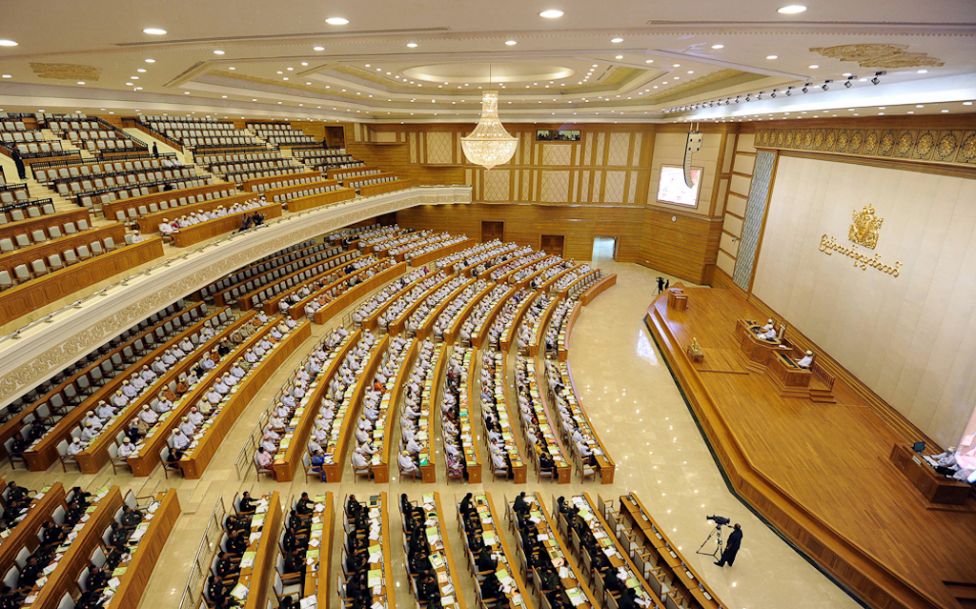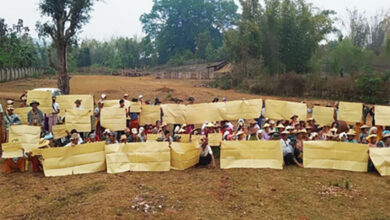Burma’s Move on Marriage Restrictions Spark International Alarm of an Attack on Rights of Women and Minorities

Alarm is mounting over a suit of newly proposed laws regarding marriage and religion, proposed by a group allegedly connected to the extremist Buddhist nationalist ‘969’ movement, with international rights watchdogs and community groups alike warning that they discriminate against minorities and could further inflame inter-communal violence.
Burma’s government is currently considering four laws related to marriage, religion, polygamy and family planning – at least two of them directly undermine the rights of minorities and women, rights groups warn.
In an official statement last week, Human Rights Watch condemned the proposed laws as encouraging further “repression and violence against Muslims and other religious minorities.”
One of the proposed laws, entitled the ‘The Emergency Provisions on Marriage Act for Burmese Buddhist Women’ – also known as the inter-faith marriage law – makes it illegal for a Buddhist woman to marry a non-Buddhist partner unless the man converts to Buddhism before marriage. Violation of this proposed law could lead to a draconian 10-year prison sentence and confiscation of personal property.
Another law requires that any Burmese citizen who plans to change religion must first seek series of permissions from local representatives of government departments, including the Ministries of Religion, Education, Immigration and Population, and Women’s Affairs, and wait 90 days for permission to be granted. Proselytizing, forcing someone to convert, or insulting another religion would become punishable by up to one year in prison.
Brad Adams, HRW’s Asia Director, slammed the religion law. “Burma’s government is stoking communal tensions by considering a draft law that will politicize religion and permit government intrusion on decisions of faith,” Mr. Adams said, “Following more than two years of anti-Muslim violence, this law would put Muslims and other religious minorities in an even more precarious situation.”
Mr. Adams warned that anti-Muslim violence was a “powder keg” and that the international community needed to intervene.
“The government’s failure to address anti-Muslim repression and violence in the country is a powder keg waiting to be lit,” Mr. Adams said. “International donors, investors, and governments need to vocally oppose this law and other laws and policies that could result in long-term religious discrimination in Burma.”
The laws now being considered by Burma’s Ministry of Religious Affairs were first proposed by a Buddhist organisation called the Association for the Protection of Race and Religion. HRW alleges that the group is connected to the extremist nationalist Buddhist monk movement known as ‘969,’ now internationally infamous for anti-Muslim ideology including the calling of boycotts of Muslim-owned shops.
One of 969’s movement’s senior leaders, the monk U Wirathu, has been quoted in Burmese media saying that “[Muslims] are breeding so fast and they are stealing our women, raping them.” U Wirathu has also allegedly said that most of Burma’s Muslims are “radical, bad people.”
Thein Sein and the speaker of the national assembly, Thura Shwe Mann, have already instructed ministries and departments to convert the monks’ draft laws into government-endorsed drafts to be considered by the public before being introduced into the lower house of parliament after June 20 in the assembly’s current session, HRW said.
HRW noted that the proposed laws not only violated the Universal Declaration of Human Rights but also Burma’s own 2008 constitution which states that that citizens may “freely profess and practice religion subject to public order, morality or health,” and article 348 ensures that the state “shall not discriminate against any citizen … based on race, birth, religion, official position, status, culture, sex and wealth.”
Matthew Smith, executive director of Fortify Rights, a human rights watchdog, said in an interview with Karen News that Burma’s government would be go backwards on human rights if the religion law passed. “If passed, this law would stand in clear violation of basic human rights and it would demonstrate a significant backtracking on human rights. It should be condemned by concerned citizens in the country as well as by the international community.”
Mr. Smith added that the laws could incite further racial hatred in Burma. “There is a serious risk this law and others like it would contribute to more violence and racial hatred in the country. This law is coming at a time when the country needs to be uniting and making every effort to protect the rights of religious and ethnic minorities.”
The laws have been met with stiff domestic opposition from some quarters, especially from women’s rights organisations and ethnic groups. On May 6, a coalition of 97 Burma based women’s groups and community-based organisations – including the Women’s League of Burma and the Karen Women’s Organisation – signed a joint petition rejecting the inter-faith marriage law. Nationalist monks, in response, referred to the coalition as “lice that live under the skin,” with U Wirathu calling them traitors, HRW claimed.
Burmese Muslims visiting or working at the Thai-Burma border town of Mae Sot expressed their concerns to Karen News over the inter-faith marriage law. Their names have been withheld to protect their identities.
“I cannot trust the Burmese government. They say that Buddhist and Muslims cannot marry,” one Muslim man said, “So they have to go on pretending they are not married. If they get married in Mae Sot then they cannot go back to Burma either – they get stuck outside Burma.”
A Muslim woman from Yangon expressed anger at the proposed law. “The government doesn’t allow Muslim women to have their choice. The situation in Burma is difficult. If the government asks why did you become a Muslim? I would say because I love my husband – who is Muslim – and my religion. I should be able to choose.”
The woman said she would be forced to marry a man from another religion in secret if the law passed. “If I love someone then I will marry them, but if they are not Muslim then I would have to do it in secret.” She said that the Burmese government was instigating hatred against Muslims in Burma for political reasons. “When I go to Yangon I get along with Buddhists just fine but the policies of this government are no good. Oppression against Muslims is because of this government – they are making us Muslims the problem for their own ends.”




